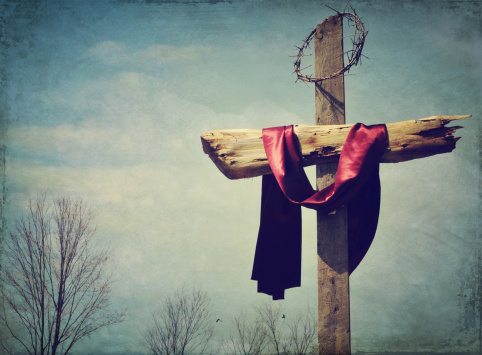
In an increasingly diverse Christian community, there is much ambivalence toward Good Friday. Many argue correctly that Easter—not Good Friday—is the centerpiece of the Christian story. Augustine puts it best: “We are Easter people, and ‘alleluia’ is our song!”
Clearly what happened on that hill outside Jerusalem was nothing short of horrible. Jesus, falsely accused of heresy, was put to death in the most brutal of ways: crucifixion, the greatest tool of Caesar’s state-sponsored terrorism.
But the reality of Good Friday isn’t limited to the historical event in first-century Palestine. The cross has cosmic implications for people of all generations.
In Jesus, God comes down into the fullness of human dysfunction: its bigotry, terrorism, disloyalty, brokenness and sin. In Jesus Christ, God wears the body of anyone who is lost and broken.
This is what’s so good about this day: God is willing to get caught in the chaos of our world, to take on our brokenness and to transform it. By loving us through the life and death of Jesus, God reimagined the world and the possibilities for it.
Two thousand years later, too many Christians think Jesus’s death on the cross simply means that we get to go to heaven when we die (and other people don’t). Let’s be clear: The Good Friday message is not: “Jesus died on the cross, and here’s what it means for us when we die.” The real lesson is: “Jesus died on the cross, and here’s what it means for us right here and right now.”
Jesus takes on the cross to destroy all crosses of every generation. Where is the cross today? It’s everywhere if we open our eyes to see it.
How many fall victim to the silent cross of institutional violence as our leaders time and again fail to address the needs of their people? How many suffer under the cross of personal and structural racism, bigotry, sexism and homophobia? From the moment of conception, there is often contempt for the rights of society’s most fragile persons and peoples.
The suffering of the innocent at the hands of terrorists never ceases to hit us. So, too, the dominance of money with its corollary effects of the trafficking of persons, drugs and corruption. Though some deceive themselves into pretending that we live in a continually progressive society, it seems that a common currency today is material and moral misery. The destruction of the working class, unjust and inhumane immigration policies, and endless foreign wars and conflicts add to the litany of despair.
The errors and sins of the Church cannot be excluded from this vista. Too many times in our words and actions we have failed to be faithful companions of Jesus. How many people have experienced exclusion, judgment, and physical and emotional abuse within our walls?
But the problem isn’t just “out there.” As Pope Francis reminds us, we, too, have unwittingly promoted the cross in the way we live our personal lives:
The great danger in today’s world, pervaded as it is by consumerism, is the desolation and anguish born of a complacent yet covetous heart, the feverish pursuit of frivolous pleasures, and a blunted conscience. Whenever our interior life becomes caught up in its own interests and concerns, there is no longer room for others, no place for the poor. God’s voice is no longer heard, the quiet joy of his love is no longer felt, and the desire to do good fades.
Amidst all this, it’s reasonable to ask: Can we do anything about it?
For all its violence and horror, Good Friday reminds us that, yes, we can change.
It is an invitation to remove the makeup and plastic smiles that too often color our lives and admit that something isn’t right in ourselves and in the world. Today is the day to cry out with the Psalmist: “Forgive us, O Lord, for we have sinned!
When we admit our own failings and take on the crosses of others, we will find the wisdom of St. John of the Cross: “Where there is no love, put love there, and love you shall find.”
Today, the Church invites us to take up Jesus’s journey to the cross. The road is uncomfortable, but it isn’t fruitless. In this journey, we will experience hardships and sufferings, but we, too, will experience the love that makes us whole, sets us free and makes our Easter joy complete.
More Must-Reads from TIME
- Donald Trump Is TIME's 2024 Person of the Year
- Why We Chose Trump as Person of the Year
- Is Intermittent Fasting Good or Bad for You?
- The 100 Must-Read Books of 2024
- The 20 Best Christmas TV Episodes
- Column: If Optimism Feels Ridiculous Now, Try Hope
- The Future of Climate Action Is Trade Policy
- Merle Bombardieri Is Helping People Make the Baby Decision
Contact us at letters@time.com